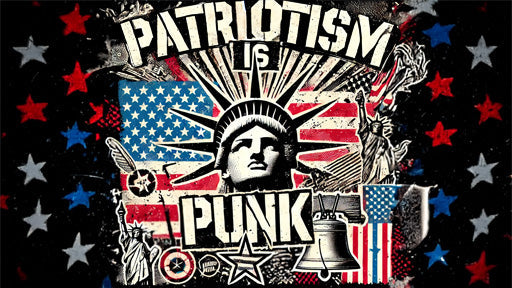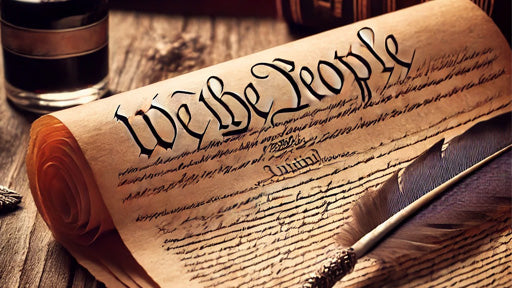Article: Trump Victory: How Patriotism and Conservatism Became the New Punk Rock

Trump Victory: How Patriotism and Conservatism Became the New Punk Rock
In a world where mainstream culture often leans into progressive ideals, there’s a rising countercurrent that’s defying expectations: the revival of patriotism and conservatism as the new symbols of rebellion. Sound crazy? Maybe—but think back to the essence of punk rock in the late ’70s and early ’80s. It was raw, unapologetic, and fiercely anti-establishment. Fast-forward to today, and you might argue that the establishment has flipped. Now, waving the flag or defending traditional values feels like sticking it to the man.
Here’s why patriotism and conservatism are the new punk rock.
Counterculture Always Lives on the Fringe
Punk rock wasn’t born in polished arenas or corporate boardrooms. It rose from the gritty basements and dive bars, flipping a middle finger to the cultural and political elites of the time. Similarly, today’s unapologetically patriotic and conservative voices exist on the edges of a cultural landscape dominated by globalism, woke capitalism, and progressive norms.
Flying the American flag or speaking out about free speech and family values isn’t trendy—it’s controversial. And if there’s one thing punk rock loved, it was controversy. For many, taking pride in one’s country or advocating for personal responsibility is the equivalent of screaming into a mic in a sweaty mosh pit, daring someone to challenge them.
DIY Attitude: Build It Yourself
One of punk’s defining traits was its DIY (do-it-yourself) ethos. When major labels refused to support them, punk bands made their own records, hand-screened their own merch, and stapled their own gig posters on city walls. Similarly, today’s conservative counterculture thrives outside traditional media, creating its own platforms, podcasts, and social networks to share ideas.
Big Tech? No thanks. The “DIY conservatives” are building their own spaces, bypassing the gatekeepers and taking their message directly to the people. Think Substack newsletters, rumbling podcast studios, and grassroots events that echo the underground gigs of punk’s golden years.
Rebellion Against Groupthink
Punk rock stood for individuality and rebellion against conformity, whether that meant challenging government policies or rejecting corporate control. Similarly, modern conservatism and patriotism are often framed as rebellions against what many see as a monolithic, politically correct culture that stifles dissent.
In this context, standing up for conservative principles isn’t about fitting in—it’s about rejecting what’s expected. It’s saying, “I’m not ashamed of my country, my values, or my beliefs, and you can’t cancel me for it.” That’s as punk as it gets.
Iconography of Rebellion
Just as punk repurposed safety pins, leather jackets, and mohawks into symbols of defiance, patriotism and conservatism are reclaiming their own symbols of rebellion. The American flag, for example, isn’t just a banner of national pride—it’s now a symbol of countercultural defiance. It’s being adopted in ways that aren’t sterile or corporate but raw and gritty, like the “Patriotism is Punk” t-shirt designs that feel like they’ve been ripped straight from a punk zine.
And just as punk rock had its outspoken icons—Johnny Rotten, Joe Strummer, and Siouxsie Sioux—this new movement has its own polarizing figures. Love them or hate them, they spark the same visceral reactions punk idols once did.
Rethinking the Establishment
Punk rock famously said, “Destroy the system.” But what happens when the system itself flips? If mainstream institutions—entertainment, media, education—largely embrace progressive ideals, those who challenge them are no longer the establishment but the underdogs. Patriotism and conservatism have taken on a renegade spirit, positioning themselves as David to the cultural Goliath.
What’s more punk rock than defying the powers that be, especially when they tell you how to think, speak, or act? Whether it’s questioning global narratives, rejecting cancel culture, or advocating for national sovereignty, today’s conservatives aren’t playing by the rules. They’re setting their own.
A Loud, Rebellious Voice
At its heart, punk rock wasn’t about being nice. It was loud, brash, and polarizing. Similarly, today’s conservative counterculture doesn’t mince words. It embraces the chaos of debate, the messiness of ideas, and the friction that comes with challenging the dominant narrative. It’s not clean or polished, but neither was punk.
This isn’t about wearing suits and ties—it’s about ripped jeans, work boots, bold ideas, and defiance against anything that feels like oppression, even if it comes wrapped in virtue signaling and hashtags. It’s a rebellion, plain and simple.
The New Punk Rock?
Whether you agree or not, it’s undeniable that the dynamics of counterculture are shifting. Patriotism and conservatism, like punk rock, are unapologetic and divisive. They provoke thought, evoke passion, and refuse to bow to the mainstream. And just like punk, they’ve become a rallying cry for those who feel unheard, misrepresented, or left behind.
So, is patriotism the new punk rock? It might be. And if the sight of someone unapologetically waving a flag, wearing a shirt, sporting a hat, or questioning the cultural status quo gets under your skin, well, that’s exactly what punk was designed to do.


Leave a comment
This site is protected by hCaptcha and the hCaptcha Privacy Policy and Terms of Service apply.